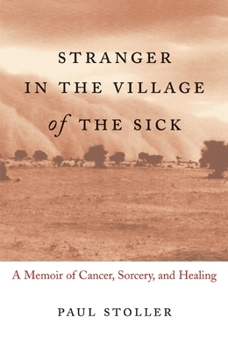Stranger in the Village of the Sick: A Memoir of Cancer, Sorcery, and Healing
Select Format
Select Condition 
Book Overview
After more than fifty years of good health, anthropologist Paul Stoller suddenly found himself diagnosed with lymphoma. The only thing more transformative than his fear and dread of cancer was the place it ultimately took him: twenty-five years back in time to his days as an apprentice to a West African sorcerer, Adamu Jenitongo. Stranger in the Village of the Sick follows Stoller down this unexpected path toward personal discovery,...
Format:Paperback
Language:English
ISBN:0807072613
ISBN13:9780807072615
Release Date:April 2005
Publisher:Beacon Press
Length:240 Pages
Weight:0.60 lbs.
Dimensions:0.5" x 5.5" x 8.5"
Related Subjects
Administration & Medicine Economics Administration & Policy Alternative Medicine Cancer Customs & Traditions Diseases & Physical Ailments Earth-Based Religions Healing Health Health Care Delivery Health, Fitness & Dieting Health, Fitness & Dieting Lymphatic Medical Medical Books Politics & Social Sciences Professionals & Academics Social Sciences Textbooks Wicca WitchcraftCustomer Reviews
2 ratings
A unique ability to handle cancer's special challenges
Published by Thriftbooks.com User , 19 years ago
Cancer and sorcery would not seem words to be used in the same subtitle at all, yet yoga-practicing anthropologist and sorcerer Paul Stoller found himself in an unusual position when diagnosed with lymphoma, and used the lessons of West African life and health to beat his disease. Ironically, the Songhay sorcery he studied professionally led to a unique ability to handle cancer's special challenges, and his lessons are imparted in Stranger In The Village Of The Sick, a deft blending of autobiographical memoir and anthropological healing insight.
Stranger in a strange land
Published by Thriftbooks.com User , 19 years ago
"Stranger in the Village of the Sick" is a memoir by anthropologist Paul Stoller about his experiences as a newly-diagnosed cancer patient. He juxtaposes with these with reflections on his earlier experiences as a student of sorcery in Africa. In 2001, the previously healthy Stoller was diagnosed with non-Hodgkins lymphoma (slow-growing follicular B-cell lymphoma to be exact). As for many--if not most--cancer sufferers, this diagnosis came like a bolt out of the blue, causing the author to reevaluate his life, his experiences, and his way of looking at the world. As Stoller notes, his form of cancer is ultimately "incurable" but at the same time, "highly treatable." In other words, Stoller was told, he coulld, with treatment, expect many more years of active life. Stoller underwent cutting-edge chemotherapy, which put his disease into remission. The facts of Stoller's diagnosis and treatment provide only the bare bones of the book. Most people find it impossible to confront a potentially lethal disease without having their view of themselves and their lives changed. For many, this leads to a deepening sense of the spiritual and an appreciation of the moment. For the author, it led him to return to his memories of earlier anthropological fieldwork among the Songhay of Niger. As a young man, he had several extraordinary and frightening encounters with sorcerers. He developed a healthy respect for their powers and become an apprentice sorcerer himself. His book, "In Sorcery's Shadow" (with Cheryl Olkes) was the result of that experience. As he notes, he THOUGHT he understood the Songhay worldview and the way of Songhay sorcery. But, as Stoller discovered, his earlier understandings of Songhay sorcery and society were only superficial. As a young man, he had been incapable of grasping the deeper philosophical currents. As he went through his diagnosis and treatment, his earlier Songhay mentor, Adamu Jenitongo resurfaced in dreams and memories. Stoller found himself recalling his earlier experiences and comparing Songhay attitudes toward life, death, and illness with those of modern American society. He found much of value in the stoic Songhay attitude toward the hardships of life. According to an incantation Stoller had been taught by his mentor, men have "thirty points of misfortune" and women "forty." Each point is a crossroads, where each person must decide which new path to choose and how to travel it. Songhay accept that these cannot be avoided and, in fact, that illness and misfortune are always present. This, as Stoller explains, is very unlike American views, in which illness is not a normal part of life, but instead, something that must be fought and eradicated. Stoller also points to the social web that ties Songhay society together far more tightly than do similar ties of family and friendship in the United States. Looking again at an incantation that he has known for years, he comes to a new understanding





